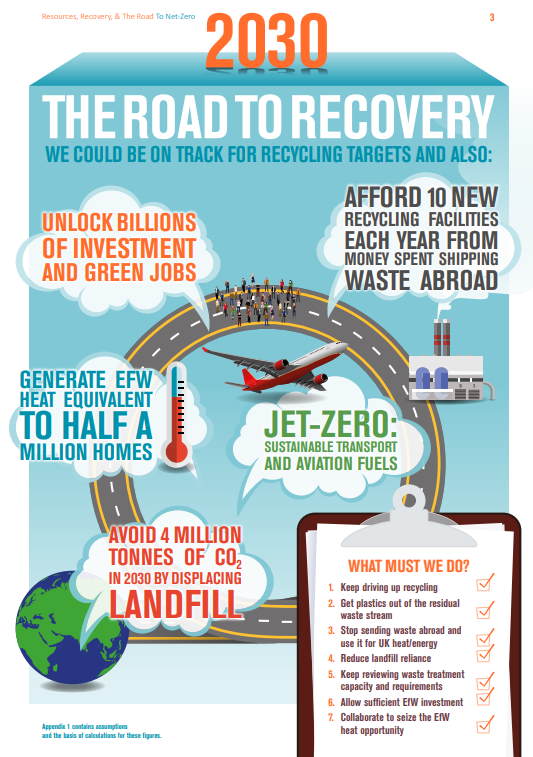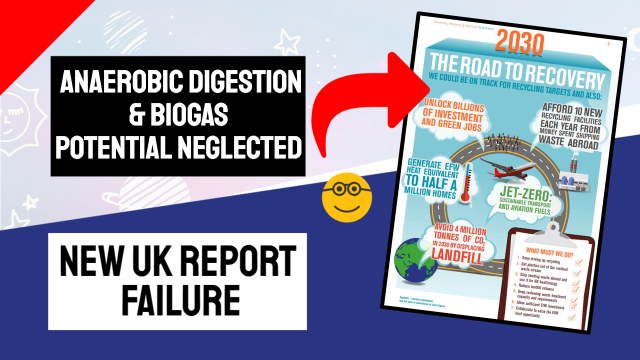Not for the first time “biogas potential has been neglected” – we reported in August 2020. An influential Think-Tank report has now been published by experts who should know better, and which completely misunderstands and ignores the full scope and potential of the anaerobic digestion and biogas industry “on the road to recovery”.

Referring to AD solely as a technology for the treatment of food waste and only once in the entire report, shows such a lack of knowledge that it simply has to be called out for the nonsense it is.
But, it doesn't stop there as, unfortunately, the omission of any proper recognition of the potential of biogas results in a conclusion which lacks any reference to action on energy from waste by anaerobic digestion.
ADBA (The Anaerobic Digestion and Bioresources Association), which has for many years stressed biogas potential, has published their own reaction to this report, which is reproduced below:
It is time to understand AD & the biogas potential: ADBA responds to Policy Connect report
ADBA Press Relase Posted on 06 Aug, 2020 by Giulia Ceccarelli:
Out of the 674 anaerobic digestion (AD) plants in the UK, just over 100 treat solely food waste, over three times as many treat agricultural wastes and 164 wastewater, while the rest treat a combination of different organic wastes. All are turning what we perceive as ‘waste’ organic material that would otherwise be causing a health hazard and emitting harmful methane emissions, into green energy and natural bio fertilisers, demonstrating AD’S role at the heart of the circular economy of organic wastes. AD, therefore, with its enormous biogas potential has a central role to play in waste policy in the UK. The first step is to understand this ready-to-use technology.
In mentioning AD, the latest Policy Connect report, which calls for a Scandinavian approach to waste policy in the UK and argues in favour of Energy from Waste (EfW) versus landfilling. ADBA points out that the report commits the mistake of referring to AD solely as a technology for the treatment of food waste. Ignoring the biogas potential in renewable energy and the many other benefits.
AD is a widely available circular economy technology (indeed it has been treating our sewage here in the UK for decades), that has been recognised as the preferred technology for managing residual food waste, as acknowledged in the Policy Connect report.
However, its role in recycling waste to generate energy goes far beyond that. AD treats, and most importantly, recycles, a much greater range of organic wastes into green renewable energy and a low carbon biofertilizer, digestate, that recovers nutrients and organic matter to help restore our depleted soils.
When pledging to achieve Net Zero by 2040, the National Farmers Union identified AD as a key technology to meet its ambitious target.
“AD has a role in agriculture across all scales”, said NFU Chief Renewable Energy Adviser Jonathan Scurlock, “using animal manures, crops and crop by-products to create low-carbon gas to replace fossil fuels and petrochemicals, while returning nutrients and organic matter to land – and perhaps in the future to actively remove CO2 from the atmosphere.”
AD is also a vital technology for the treatment of wastewater.
“EFW plants certainly have a role to play in recycling some wastes”, said Howard Burton from leading pump and mixer manufacturer, Landia, – “But with the increasing amount of digester mixing equipment that we are supplying to UK water companies, we can see first-hand just how valuable a feedstock wastewater sludge is for Anaerobic Digestion plants. AD/Biogas provides a tremendous opportunity to bolster both electricity and gas supplies, whilst also recycling a wide range of organic wastes (not just food waste), and producing a valuable fertilizer.”
ADBA Chief Executive Charlotte Morton said: “AD and the specificity of our sector remain widely misunderstood. Since this technology by definition has application in many different sectors, AD is often grouped with other technologies under various labels – EfW, Renewables, Bioenergy, Biofuels – without a clear understanding of AD’s role at the heart of the circular economy and its enormous potential. Lack of awareness is often the underlying cause, therefore we at ADBA call on the Government, civil servants and local authorities to attend ADBA’s L&D event “Introduction to AD” on 25th August to educate themselves on this incredible technology which can deliver a 6% reduction of total UK carbon emissions today, and with it 30,000 new green jobs.”
– ADBA Press Release ENDS –
Why The Policy Connect report “No Time to Waste” Needs Re-thinking to Add the Role of Anaerobic Digestion and Biogas Where It Should Be
Anyone who places Anaerobic Digestion in one particular box fails to appreciate that as a natural process which began in a geological time before the atmosphere of our planet even existed, in its current form, will not understand how deeply interrelated the technology is within the natural biological processes of this planet.
It makes no sense to omit it from policy decisions on Energy from Waste (EfW), although maybe it doesn't quite fit neatly into the popular perception of EfW.
“As aerobic organisms, will men (and women) for ever be blind to anaerobic organisms. Who would talk about night, without considering day?”
It is time that humankind being an oxygen-driven organism, stopped to think for a moment about just how little of the universe is an oxygen-rich environment. Huge biogas potential exists from decomposition without oxygen. Science devotes vast resources to the aerobic realm and yet it is tiny compared with the undersea and below-ground realm which is oxygen starved.
Our planet is the only one, so far as knowledge extends, with an oxygen-rich atmosphere. The presence of oxygen is minute when compared with the vast planetary realms of anaerobic life both on this planet beneath the earth's surface, in the deep oceans, and across the entire universe.
Wake up! Anaerobic digestion isn't some weird phenomenon in a digester tank somewhere – although it is that as well!.
The organisms and the process are all-pervading. It is all around us, and will long outlive us. Anaerobic organisms known as archaea, as far as I am aware, do not need the sun to survive! The potential is so great, the chemistry so complex, that science has hardly begun to scratch the surface of the subject.
There are currently 674 AD plants operating in the UK generating 1.2 billion m3 of biomethane, enough to heat 1 million homes each year, and 40 million tonnes of digestate for use as a biofertiliser. The industry currently helps reduce UK annual greenhouse gas emissions by 1% and employs over 3,500 people in the UK. Source: ADBA
At full potential, the AD industry could reduce the UK’s total annual emissions by 6% by 2030; fuel UK’s bus fleet six times over or 97% of HGVs; and directly create over 30,000 new green jobs, with another 30,000 indirect jobs created as a result of the industry’s growth. Source: ADBA
It cannot be right to ignore it…
Frequently Asked Questions
1. What is Anaerobic Digestion?
Anaerobic digestion is a natural process where microorganisms break down organic materials in an oxygen-free environment. This process produces biogas which can be used as a renewable energy source. It also yields digestate, a nutrient-rich substance that can be used as a biofertilizer.
2. What is the current state of the AD industry in the UK?
As of the latest data, there are 674 AD plants in the UK. They generate 1.2 billion m3 of biomethane annually, sufficient to heat 1 million homes. In addition, these plants produce 40 million tonnes of digestate for use as a biofertilizer. The AD industry helps to reduce UK's annual greenhouse gas emissions by 1% and employs over 3,500 people.
3. What is the Biogas Potential of the AD industry in the UK?
If fully utilized, the biogas potential of the AD industry could reduce the UK’s total annual emissions by 6% by 2030. It could fuel the UK’s bus fleet six times over or provide for 97% of HGVs. The industry could also directly create over 30,000 new green jobs, and indirectly create another 30,000 jobs due to the industry's growth.
4. What is biomethane?
Biomethane is a renewable gas produced during anaerobic digestion. It can be used for heating, electricity generation, and as a transport fuel. It is a sustainable alternative to natural gas.
5. What is digestate?
Digestate is the solid or liquid residual material produced during the anaerobic digestion process. It is rich in nutrients and can be used as a biofertilizer, providing an environmentally friendly alternative to chemical fertilizers.
6. What are archaea?
Archaea are a group of microorganisms involved in the anaerobic digestion process. Interestingly, they can survive without the sun, underscoring the potential and complexity of anaerobic digestion.
7. How does the AD industry contribute to reducing greenhouse gas emissions?
The AD industry contributes to reducing greenhouse gas emissions by converting organic waste into biomethane. This process reduces the emission of methane, a potent greenhouse gas, from waste decomposition. Moreover, the produced biomethane can replace fossil fuels, resulting in lower carbon emissions.





This method’s ecological soundness has been called into doubt because of the fact that ecology and energy making do not function together in nature.